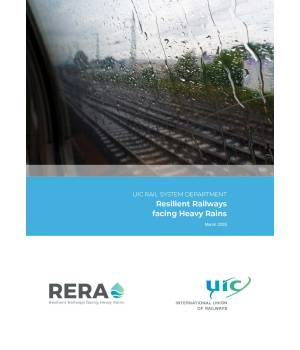
Resilient Railways facing Heavy Rains
The Resilient Railways facing Heavy Rains (RERA Rain) project provides guidelines aiming to enhance the resilience of railway systems in the face of increasingly severe precipitation events driven by climate change. Conducted in partnership with railway infrastructure managers from multiple countries, this initiative addresses the critical need for adaptive strategies that ensure the continued safety and functionality of railways amid shifting precipitation patterns.
Heavy rain events pose a wide range of challenges for railway infrastructure and operations, including structural damage, operational delays, and safety hazards. Events such as landslides, flooding, and erosion not only compromise the integrity of critical components such as tracks, embankments, and bridges, but also disrupt operations, endangering both passengers and goods. In the face of these hazards, traditional methods of planning, which rely on historic climate patterns, are proving inadequate. Therefore, there is now an urgent need to rethink how railway systems are designed, maintained, and managed, ensuring they can withstand and adapt to the evolving risks posed by climate change.
This document summarises the findings of the RERA Rain project, beginning with an analysis of recent precipitation-related incidents on railway infrastructure in different regions. Through these real-world case studies, common challenges were identified, particularly regarding the difficulty in predicting future rainfall patterns and assessing the vulnerabilities of railway systems in the context of climate change.
| Auteur | UIC |
| ISBN | 978-2-7461-3484-3 |
| Pages | 88 |
Fiche technique
- Langage
- Anglais
- Format
- Téléchargeable
- Edition
- Ed. no.1
- Date d'édition
- 01/03/2025
- Date de publication
- 26/03/2025
- Nombre de pages
- 88
- sku
- 5-25006E-PDF
- Reference
- 5-25006E
 Préférences sur les cookies
Préférences sur les cookies

